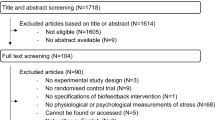Abstract
The present study compared the relative efficacy of a behavioral stressmanagement procedure versus a pharmacologic method (the beta-blocker propranolol) in reducing psychophysiological reactivity in post-myocardial infarction (MI) patients. A pretreatment-posttreatment assessment design was used, with 10 patients participating in six separate sessions. The first session involved evaluating psychophysiological reactivity to an emotional stressor (a public-speaking task). The subsequent five sessions involved the administration of the respective treatments, either stress management or drug. The patients were randomly assigned to each treatment group. The public-speaking stressor was readministered after the last treatment session. Results demonstrated that behavioral stress management reduced psychophysiological reactivity to public speaking to the same level seen with propranolol. The findings suggest that this nonpharmacological approach could be of use when beta-blocker therapy is not desired, not practical, or medically contraindicated.
Similar content being viewed by others
References
Beta-Blocker Heart Attack Trial Research Group (1982). A randomized trial of propranolol in patients with acute myocardial infarction.JAMA 247: 1707–1717.
Freedman, A. M. (1980). Psychopharmacology and psychotherapy in the treatment of anxiety.Pharmakopsychiatry 13: 277–289.
Gatchel, R. J. (1979). Biofeedback and the treatment of fear and anxiety. In Gatchel, R. J., and Price, K. P. (eds.),Clinical Applications of Biofeedback: Appraisal & Status, Elmsford, N.Y. (1979).
Gatchel, R. J., and Proctor, J. D. (1976). Effectiveness of voluntary heart rate control in reducing speech anxiety.J. Consult. Clin. Psychol. 44: 381–389.
Gatchel, R. J., Hatch, J. P., Watson, P. J., Smith, D., and Gaas, E. (1977). Comparative effectiveness of voluntary heart rate control and muscular relaxation as active coping skills for reducing speech anxiety.J. Consult. Clin. Psychol. 45: 1093–1100.
Gatchel, R. J., Hatch, J. P., Maynard, A., Turns, R., and Taunton-Blackwood, A. A comparison of heart rate biofeedback, false biofeedback, and systematic desensitization in reducing speech anxiety: Short-and long-term effectiveness.J. Consult. Clin. Psychol. 47: 620–622.
Krantz, D. K., Glass, D. C., Contrada, P., and Miller, D. E. (1981).The Second Five Year Outlook on Science and Technology, National Science Foundation, U.S. Government Printing Office, Washington, D.C.
Mathews, N. T. (1981). Prophylaxis of migraine and mixed headache: A randomized controlled study.Headache 21: 105–109.
Report of Medical Research Council Working Party on Mild to Moderate Hypertension (1981).Lancet 2: 539–542.
Roskies, E. (1981). Considerations in developing a treatment program for the coronary-prone (Type A) behavior pattern. In Davidson, R. O., and Davidson, S. M. (eds.),Behavioral Medicine: Changing Health Lifestyles, Bruner/Mazel, New York.
Ruberman, W., Weinblatt, E., Goldberg, J. D., and Chaudhary, B. S. (1984). Psychosocial influences on mortality after myocardial infarction.N. Engl. J. Med. 311: 552–559.
Spielberger, C., Lushene, R., and Gorsuch, R. (1970).State-Trait Anxiety Inventory Manual, Consulting Psychologists Press, Palo Alto, Calif.
Taggart, P., Caruthers, M., and Somerville, W. (1978). Emotions, catecholamines and the electrocardiogram.Prog. Cardiol. 1: 103–124.
Touri, Z. B., and Braunwald, E. (1983). The use of beta blockers after myocardial infarction.JAMA 249: 2512–2520.
Author information
Authors and Affiliations
Additional information
This research was supported by a grant to the first author from the American Heart Association, Texas Affiliate.
Rights and permissions
About this article
Cite this article
Gatchel, R.J., Gaffney, F.A. & Smith, J.E. Comparative efficacy of behavioral stress management versus propranolol in reducing psychophysiological reactivity in post-myocardial infarction patients. J Behav Med 9, 503–513 (1986). https://doi.org/10.1007/BF00845136
Accepted:
Issue Date:
DOI: https://doi.org/10.1007/BF00845136




